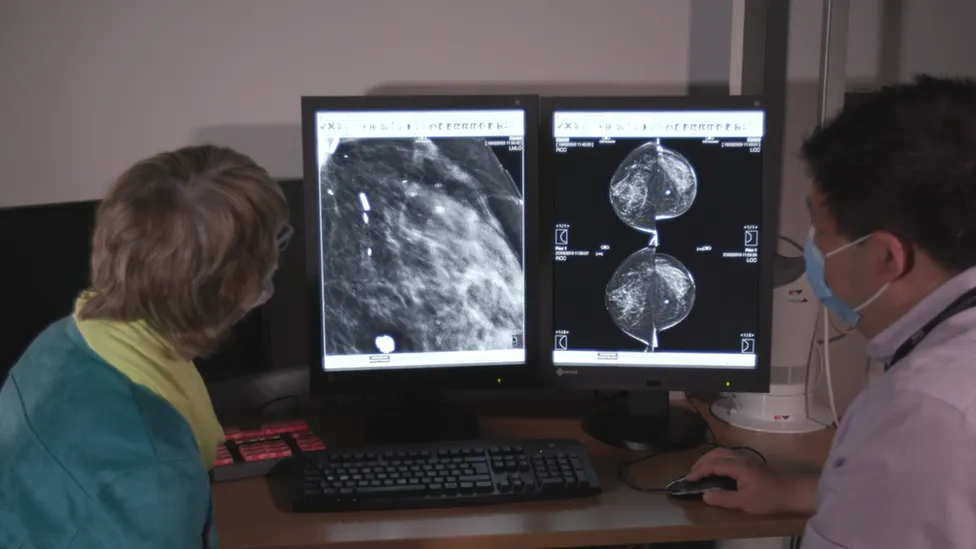Welcome to our Article Website - For latest Technology related News and Advancements in Gadgets and Gizmos, IT, AI, Health, Science, Engineering, Entertainment, SEO Marketing, Work from Anywhere and also Business. Our Curated Collection of Online Learning Articles Offers Top-Notch Insights and Resources.
Translate to your Mother Tongue and Enjoy my Articles
Tuesday, June 13, 2023
Harnessing AI in Breast Cancer Detection: Revolutionizing Mammogram Reviews for Early Diagnosis
A groundbreaking trial underway at Aberdeen Royal Infirmary in Scotland is exploring the potential of artificial intelligence (AI) to revolutionize breast cancer detection.
By assisting radiologists in reviewing mammograms, AI technology has the ability to enhance accuracy, efficiency, and patient outcomes. This article delves into the significance of AI in healthcare, the ongoing AI trial in Aberdeen, and the promising impact it holds for breast cancer screenings.
Unleashing the Potential of AI in Healthcare:
Artificial intelligence, the domain where computers perform tasks that usually require human intelligence, has already made significant strides across various industries. In healthcare, AI has proven to be a powerful tool, aiding in drug discovery, disease diagnosis, and treatment planning. Rather than replacing medical practitioners, AI is seen as a valuable resource that complements their expertise, expedites processes, and improves patient care.
The Aberdeen AI Trial: Pioneering Innovation:
Aberdeen Royal Infirmary, in collaboration with the University of Aberdeen and industry partners, is leading the Gemini project—an AI trial that focuses on breast cancer detection. The trial employs an AI model named Mia, developed by Kheiron Medical Technologies, with cloud computing services provided by Microsoft. Although automatic AI deployment is currently restricted by the National Screening Council, the trial is exploring the integration of AI as an additional check during mammogram reviews.
Addressing the Challenges in Breast Cancer Detection:
Public Health Scotland data reveals an increasing number of screen-detected breast cancers, necessitating the expertise of radiologists. However, the declining availability of radiologists poses a challenge to effectively review the growing number of mammograms. Currently, radiologists analyze approximately 5,000 mammograms per year, resulting in 250 to 300 patients being recalled for further examination. The implementation of AI aims to mitigate the risk of missed diagnoses and optimize the detection process.
How AI Augments the Detection Process:
Dr. Gerald Lip, the clinical director of the North East Scotland Breast Screening Programme, demonstrates the functionality of the AI software. By comparing mammogram results, radiologists can identify differences highlighted by the AI. The software effectively pinpoints areas of concern, enabling early detection of breast cancer. Identifying abnormalities at an early stage significantly improves the chances of successful treatment and recovery.
Enhancing Patient Experience and Empowerment:
Participants, such as June, have reported positive experiences with AI-assisted screenings. June expressed that the AI system made the process feel less intrusive and provided reassurance. With AI, patients can have increased confidence in the analysis, as the system removes the anxiety associated with human scrutiny. Early detection facilitated by AI empowers patients to take proactive measures, leading to more effective treatment and improved outcomes.
Mitigating Staff Shortages with AI:
Scotland, like many regions, is grappling with a shortage of radiology staff due to retirements and limited availability of skilled professionals. A comprehensive review of Scotland's breast screening program suggests that AI could alleviate this burden. Replacing one human reader with AI has the potential to cover half of the image reading load, which amounts to approximately 1.72 million images reviewed annually. The goal, however, is not to replace radiologists but to explore how AI can augment their work, improve efficiency, and enhance cancer detection as a safety net.
Widening AI Adoption for Breast Cancer Detection:
Kheiron Medical Technologies aims to expand the accessibility of their AI model, Mia, to more than 30 NHS trusts across the UK. Additionally, healthcare institutions in England are already exploring the integration of AI to improve outcomes for breast cancer patients. This indicates a growing acceptance of AI technology and its potential to become an essential component of breast cancer screening programs, ultimately saving lives.
Conclusion:
The ongoing AI trial at Aberdeen Royal Infirmary demonstrates the transformative potential of artificial intelligence in breast cancer detection. By assisting radiologists in reviewing mammograms, AI technology offers improved accuracy, efficiency, and patient outcomes. As AI continues to gain acceptance and adoption, it has the power to revolutionize breast cancer screenings, mitigating staff shortages, and providing a valuable tool for medical professionals in the fight against breast cancer. Harnessing the power of AI can bring us closer to a future where early-stage breast cancer detection is more effective, ultimately saving more lives.
Exploring the Power of AI in Healthcare: A BBC Program
Subscribe to:
Post Comments (Atom)
Beyond the Womb: Exploring the Brave New World of Artificial Wombs
As I flipped through the morning newspaper, a particular report grabbed my attention, uncovering a captivating yet intricate frontier in re...

No comments:
Post a Comment